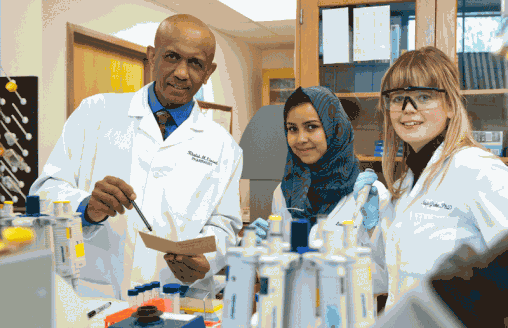
Associate professor Khalid Elased (left), M.S. student Laale Alawi and assistant professor Nadja Grobe are among those in the Department of Pharmacology and Toxicology conducting important diabetes research.
Master’s degree students in the Department of Pharmacology and Toxicology at the Wright State University Boonshoft School of Medicine are making discoveries that have the potential to save limbs and reduce kidney failure in diabetes patients.
Led by Khalid Elased, Pharm.D., Ph.D., associate professor, and Nadja Grobe, Ph.D., a research assistant professor, several master’s students in the Department of Pharmacology and Toxicology have published their findings in well-known journals, including the American Journal of Physiology Renal Physiology, PLOS ONE and Experimental Physiology, as first authors or co-authors. They also have presented their research results at national conferences such as the American Diabetes Association, American Heart Association, American Society of Nephrology and the European Society for the Study of Diabetes.
Their research focuses on the mechanisms of cardiovascular and renal, or kidney, complications of diabetes. They have found a urinary biomarker, which is far more reliable than the currently practiced method of finding protein in the urine to identify diabetes. They also have found that exercise and diet play a key role in resolving diabetes.
“When people are diagnosed with diabetes, physicians tell their patients to exercise and diet,” Elased said. “However, many patients do not follow through with exercise and diet.”
As a result, patients end up taking medicine to help with diabetes. While the medicine helps with the diabetes, it also can cause the patient to gain weight.
Elased and his students found that exercise is as good as medication. He said that through exercise, the blood glucose level and kidney function become normal. The urinary biomarker shows that the threat of diabetes has significantly decreased.
“The miracle of exercise has been proven,” he said. “Even if you don’t lose weight at the gym, you are still doing good things metabolically.”
Grobe has been instrumental in training the students in Elased’s lab. She has been assisting Elased and the students to set up, plan and conduct experiments. The lab has used a sophisticated way of analyzing urine samples through mass spectrometry, an analytical technique that identifies molecules present in solids, liquids and gases.
The students analyzed urine samples from healthy, diabetic and treated diabetic mice. They identified a protein that is only excreted in those who have diabetic kidney disease or will eventually develop kidney problems.
“The students’ findings may lead to the discovery of new noninvasive markers for diabetic kidney disease,” Grobe said. “Invasive biopsy samplings may be avoided.”
Hari Somineni, one of Elased’s master’s students, graduated in April 2013 and defended his thesis in May 2013. His first author paper, “Daily exercise training protects against albuminuria and ACE2 shedding in db/db diabetic mice,” was published in February 2014 in the Journal of Endocrinology, which focuses on endocrine physiology and metabolism. He also was a co-author of a paper, “Rosiglitazone treatment of type 2 diabetic db/db mice attenuates urinary albumin and angiotensin converting enzyme 2 excretion,” in PLOS ONE, an international, peer-reviewed, open-access, online publication.
Somineni, who is now a research assistant at Cincinnati Children’s Hospital, also discussed his research at the American Heart Association and the American Diabetes Association annual meetings.
“We discovered that physical exercise training is effective in improving type 2 diabetes and associated complications, with no compromising side effects,” Somineni said. “Physical training programs should be widely adopted into the medical care system.”
Originally from India, Somineni came to the United States to pursue a career in science. “My experience at Wright State gave me the confidence to do significant research,” he said. “By working alongside others who share the same goals as me, we will make a difference in the lives of many patients.”
Laale Alawi is a current student in the master’s program. Originally from Saudi Arabia, she did not know much about research laboratory techniques when she arrived. Elased, Grobe and students like Somineni inspired and encouraged her.
She also is researching urinary biomarkers for kidney diseases in type 2 diabetes and hypertension, or high blood pressure. Alawi is working on two papers for publication in research journals.
“I really love this experience,” she said. “I’m trying to use every minute to learn more and more.”
Like many other students, Alawi views Elased as more than a professor. He is a mentor. “Dr. Elased is patient and inspiring,” said Alawi, who would like to work in a research laboratory after she graduates in the fall of 2014. “He believes in me and encourages me in my research.”

 Wright State University Foundation awards Students First Fund grants
Wright State University Foundation awards Students First Fund grants  Cosmic collection
Cosmic collection  Wright State revives student-faculty collaborative writing journal
Wright State revives student-faculty collaborative writing journal  Fulfilling dreams
Fulfilling dreams  Wright State alumna Nicole Scherzinger wins top British theatre award as star of ‘Sunset Boulevard’
Wright State alumna Nicole Scherzinger wins top British theatre award as star of ‘Sunset Boulevard’ 